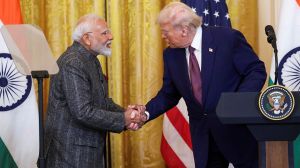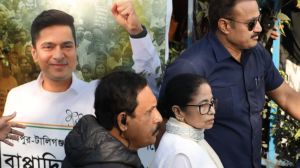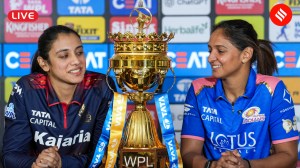Muslims need a new compass
Should Muslims vote for the BJP? The question is comprehensively incomplete. How should they vote in, say, Tamil Nadu? Neither the BJP nor t...

Should Muslims vote for the BJP? The question is comprehensively incomplete. How should they vote in, say, Tamil Nadu? Neither the BJP nor the Congress is much of a force in the state. Likewise in West Bengal. In Kerala the Congress is present but not the BJP 8212; and so on. The question acquires great relevance in the Hindi heartland, particularly in Uttar Pradesh.
The Hindi, repeat Hindi, heartland also happens to be the Hindu, repeat Hindu, heartland. After all, Kashi, Mathura, Ayodhya, Triveni, Hardwar, Rishikesh, Ganga, Jamuna, all define the civilisational heartland of Hindustan. It is for this obvious reason that 40 per cent of the country8217;s Brahmins reside in UP. This was part of the logic why Pandit Govind Ballbh Pant was the first chief minister of UP. After him, there were no significant breaks in a sequence of chief ministers who were Brahmins.
Under a Brahmin leadership, Muslims, Harijans and a sprinkling of other castes ensured a stable Congress rule. The Muslim thus far was participating in the electoral process, almost mechanically supporting the Congress. The Hindu caste pyramid and Congress were coterminus. There was no contradiction between the Muslim vote and stability of the Hindu caste pyramid.
In Bihar, a different social structure threw up political competition between Sri Krishna Sinha, a Bhumihar, and Anugrah Narain Singh, a Rajput. In political terms there was no caste pyramid with the Brahmin at the top. For the Muslim, there was no occasion to tinker with the caste pyramid as such. The fractured upper caste was overwhelmed by a Mandalised lower rung of the social ladder and the Muslim joined the winners.
In UP, the Muslim got sucked into a fierce caste tussle. The caste situation in the state was politically ablaze after the Mandal commission report was invoked to give reservation to OBCs in government jobs. This caste factor compounded an incendiary situation created by Rajiv Gandhi when, to please the Muslims, he upturned the Supreme Court judgment in the Shah Bano case. Then, to manage the Hindu backlash, he opened the locks of the Ram Mandir in Ayodhya.
On December 6, 1992 the Babri Masjid was pulled down. P.V. Narasimha Rao was prime minister. The Muslim had been only opposed to the BJP. After the fall of the Babri Masjid he defected en masse from the Congress as well. In the Hindu heartland the Muslim was now opposed to a Hindu Party and a party led by the non saffron upper caste. What were the political avenues open to him? To escape communalism, plunge headlong into caste politics? Here, the Muslim made a grave error of judgment, indicating a preference for casteism.
For the first time since Independence, the Muslim took sides in a Mahabharat internal to Hindu society. The caste pyramid was wobbly. Those at the bottom of the pyramid co-opted the Muslim to topple the structure; those at the top targeted the Muslim as the 8216;8216;other8217;8217; to keep the structure intact. Those at the bottom had not suddenly fallen in love with the Muslim, those at the top had not developed an instant hatred for him. The Muslim was being used as a tool, a foil to consolidate Hindu society on the one hand and to enlarge the size of the vote on the other to capture power. The Muslim was being used both as the 8216;8216;other8217;8217; and as an ally.
And now as he looks around the political battlefield he is without even his political compasses. He does not know which political party to support. P.V. Narasimha Rao completed his five years with the Muslim sulking away from him. Vajpayee has completed his term with the Muslim regarding him from a distance. Until 1964, the undisputed leader of Indian Muslims was Jawaharlal Nehru 8212; Panditji to everybody in the country.
Once ethnic, regional, linguistic, caste realities began to assert themselves, the Muslim too began to participate in the diffuse political processes in the rest of India. The problem remains in the Hindi heartland where social upheaval and political churning is proceeding apace. There is a certain navigational difficulty for the Muslim. It is also possible that the Muslim has reached a dead end in pursuit of 8216;8216;old8217;8217; politics.
One of the most self defeating pursuits of the past has been a search for a liberal Muslim leader. A liberal Muslim leader is a contradiction in terms, just as liberal Hindu leader or liberal Jat leader is. Muslims must stand behind enlightened leaders who promote the general purpose which will automatically encompass minority interests. An overwhelming majority of these enlightened leaders will be Hindus. There will be Muslim, Christian, Sikh leaders as well to whom Hindu voters will turn to protect their interests. Enlightened leadership must replace communal and caste leaders.
As part of the 8216;8216;new8217;8217; politics, Muslims will have to abandon an impression they communicate, particularly during elections 8212; an impression of ganging up against this or that formation. In polarised politics this stance generates a backlash. Muslims must have the flexibility to unite with all parties for their proper policies.
- 01
- 02
- 03
- 04
- 05































